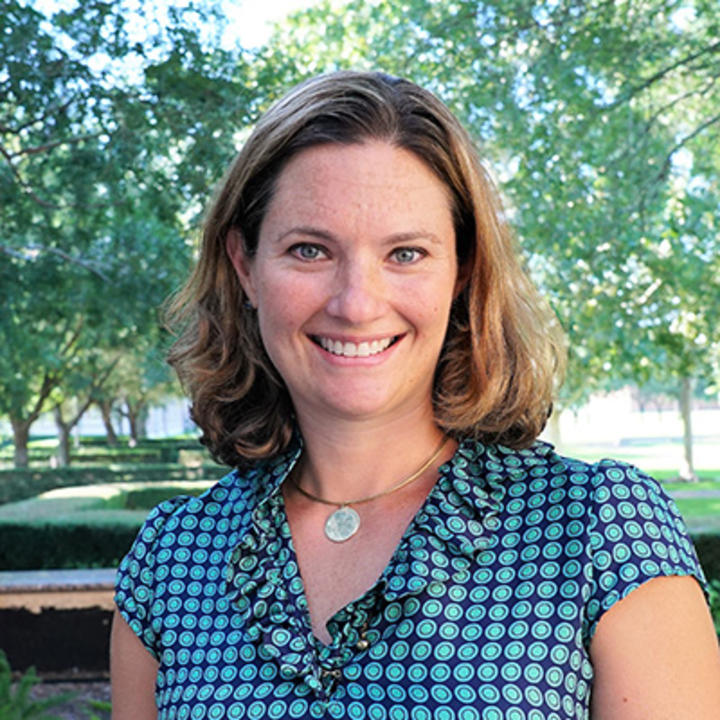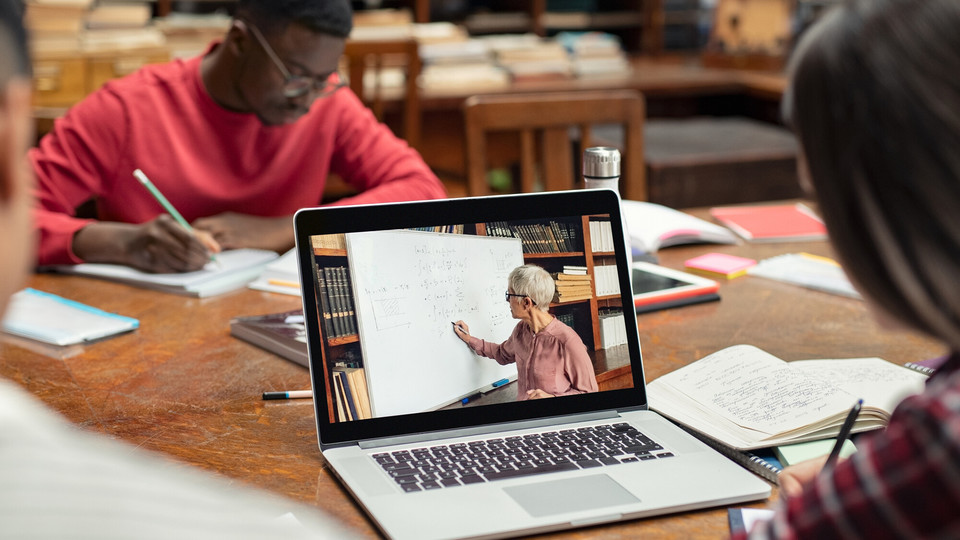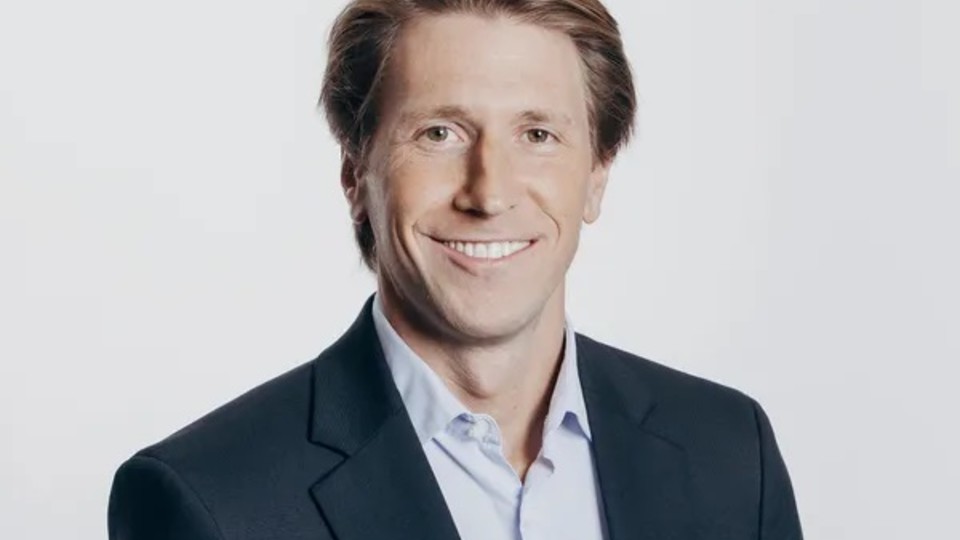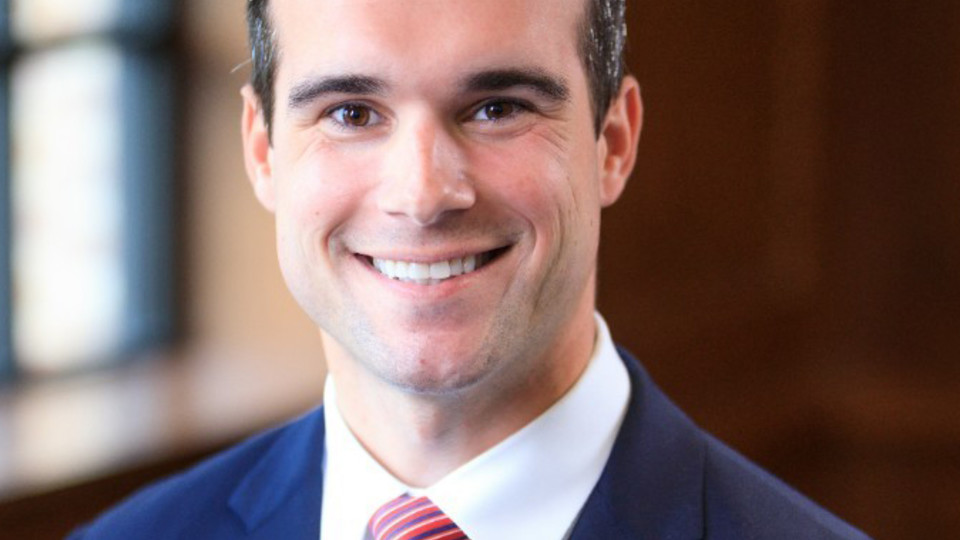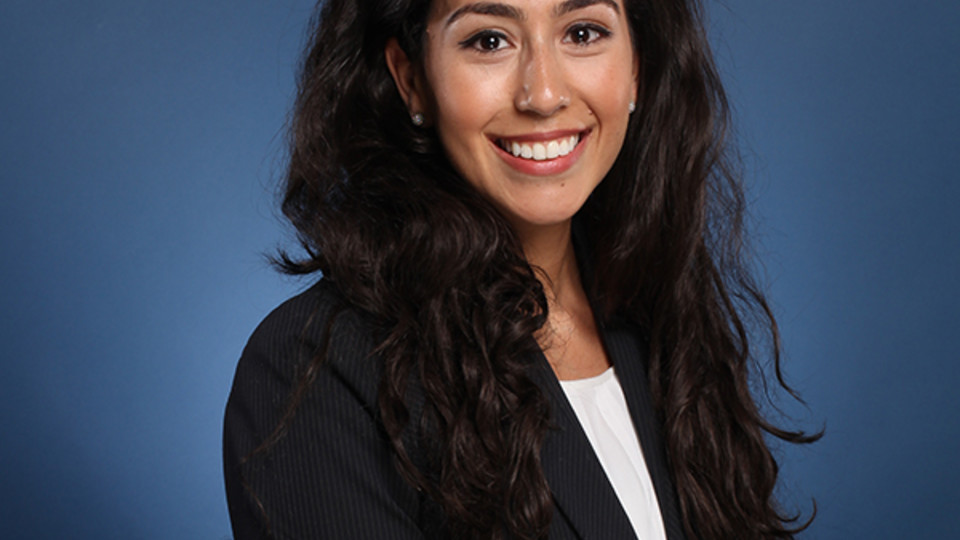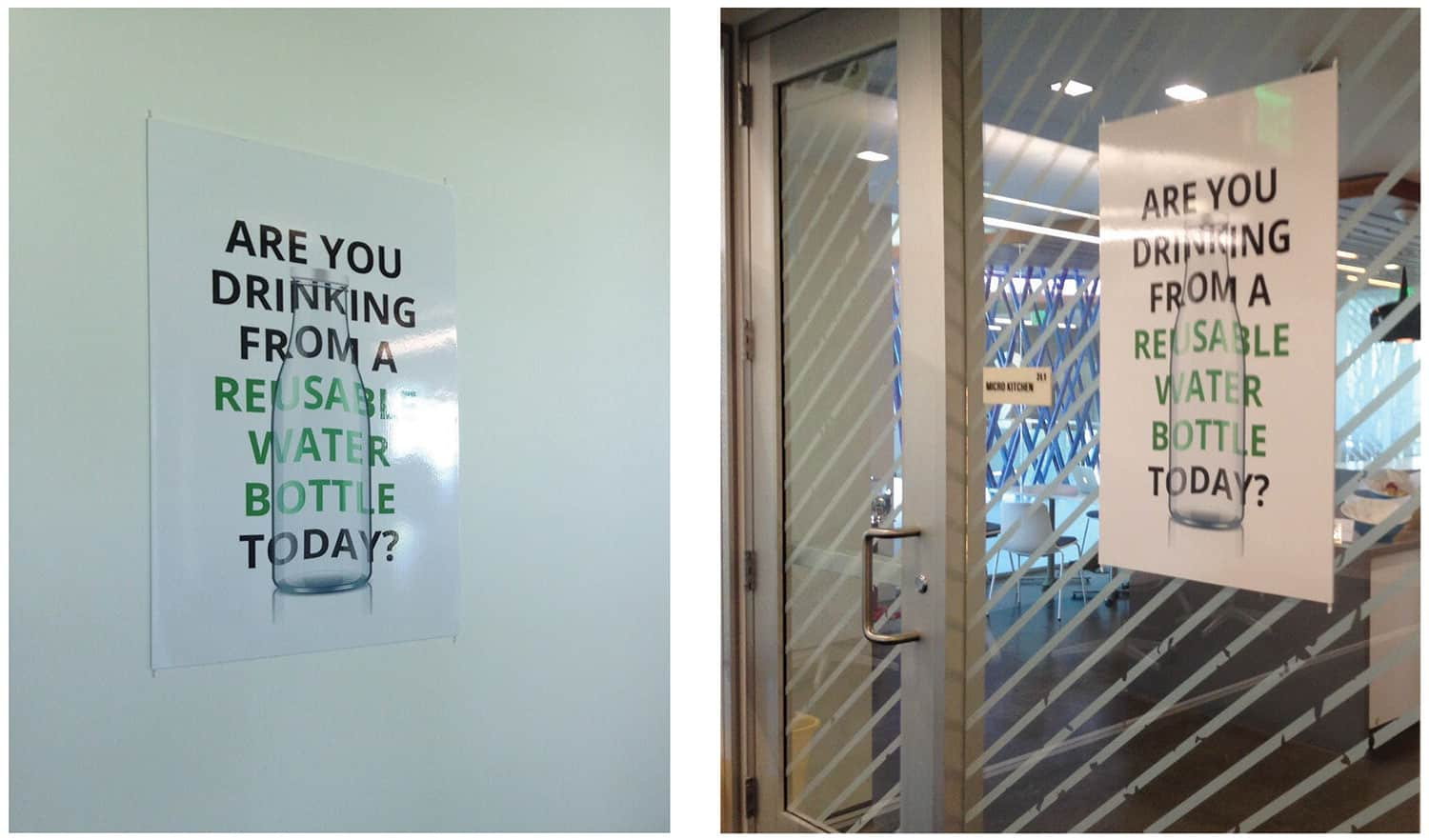
Meet the MBA Class of 2024: Jahnavi Gudi
Full-Time MBA candidate Jahnavi Gudi is determined to break barriers for first-generation women in finance. "I think it’s important to address the systemic and academic barriers for women with my background to break into these competitive fields."
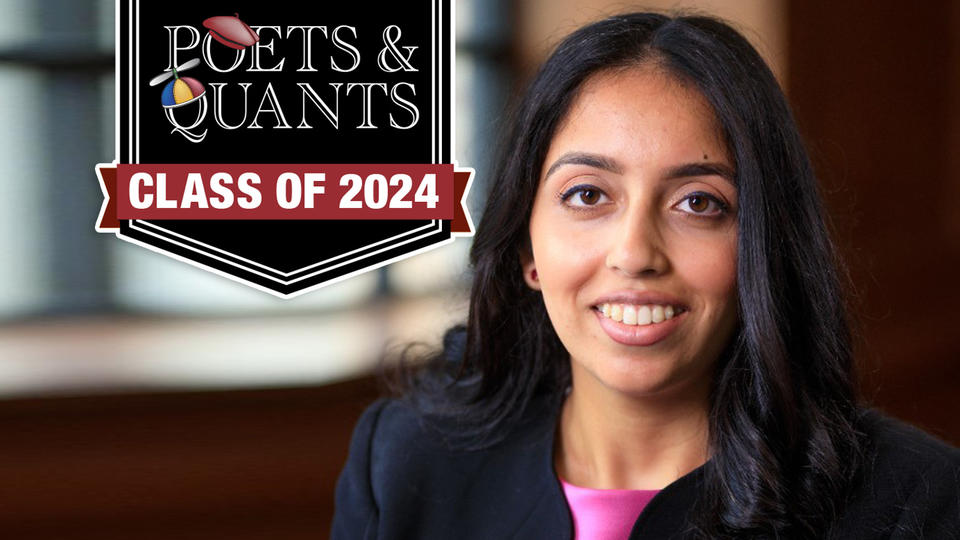
Meet the MBA Class of 2024: Tareck Haykal
Meet Tareck Haykal, a Rice MD/MBA candidate pursuing plastic surgery and entrepreneurship. "I am very interested in entrepreneurship and Rice has been #1 for four years now."
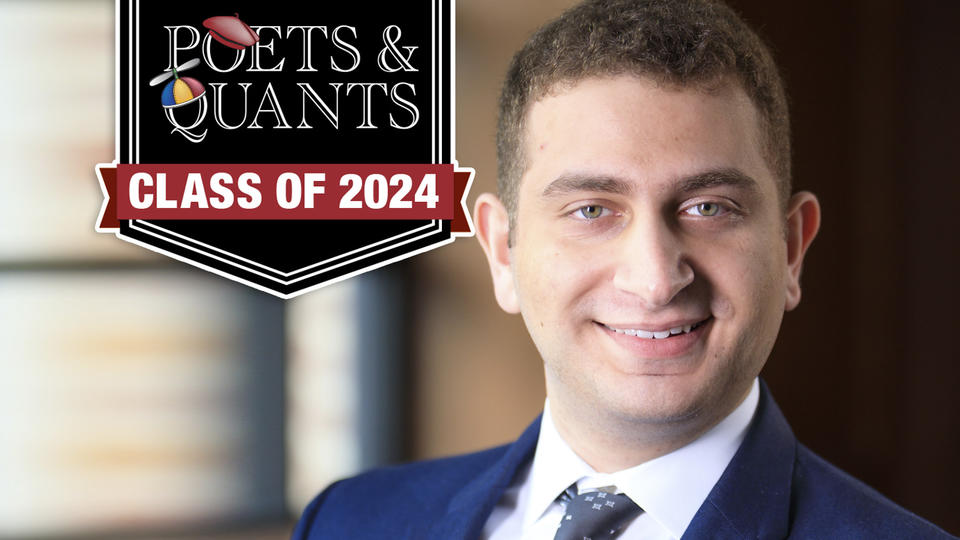
Are You Drinking From a Reusable Water Bottle Today?
How well-placed reminders help consumers build sustainable habits.


Based on research by Eleanor Putnam-Farr (Rice Business), Ravi Dhar (Yale), Margaret Gorlin (Codesmith), Jane Upritchard (Bon Appetit Management Company), Michelle Hatzis (Google), and Michiel Bakker (Google)
Key findings:
- Many people are already motivated to engage in climate-friendly behaviors, like using a reusable water bottle or shopping bag
- Reminders that come earlier in the decision-making process are more effective at changing habits
- Climate-friendly habit changes can be made without sacrificing consumption
Climate change is a well-known problem with many well-known solutions. One of them is to increase the use of reusable water bottles and shopping bags – items that most of us have but easily forget about and may present an opportunity for effective messaging.
It’s a pervasive problem, but one that Rice Business professor Eleanor Putnam-Farr has been studying along with fellow researchers. Their question: what are the best ways to remind people to make more sustainable choices? Specifically, the team wanted to know when in a consumer’s habit development are reminders most effective?
It might seem intuitive to remind people about their reusable bottles at the point they would be used — for example, by the water cooler. However, reminders that come so late in the decision-making process are ineffective for a few reasons. First, most people already know that reusable goods are better for the environment.
According to previous research, almost 80 percent of Americans believe that they understand global warming “very” or “fairly” well. Most likely, if you’re reminded to use a reusable water bottle when you’re not thinking about drinking water, the message is redundant. Worse: If you’re reminded to use a reusable water bottle after you’ve already picked up a single-use plastic container, you’ll likely experience counterproductive feelings of aversion and guilt.

The researchers proposed that sustainability reminders would be more effective when placed earlier in the decision-making process and predicted that early specific reminders would generate a routine behavior, if there is a clear reward. To assess their hypothesis, the researchers put up reminder posters in the office of a large tech company, either near the desks of participants, where they generally kept their reusable bottles, or near the water cooler.
Over the course of seven weeks, the team measured how much water was dispensed and how many single-use plastics, like water bottles and disposable cups, were used. One of the reminder messages emphasized drinking water generally (“Are you drinking enough water today?”), and the other specifically targeted reusable bottles (“Are you drinking from a reusable bottle today?”).
Before the experiment, 50% of participants said they use single-use bottles on at least some occasions, the most common reasons being convenience or forgetfulness. During the experiment, the amount of water dispensed from the water cooler increased by an average of 1.58 gallons per day. The consumption of single-use bottled water didn’t change much during the study period, but the use of disposable cups decreased significantly.
To test whether employees had formed habits around using reusable water bottles, the researchers measured water consumption in the office for two weeks after the posters were taken down.
They found that the posters led to an average increase of two gallons per day of water dispensed to reusable containers in the two weeks after they were removed. This is equivalent to reducing plastic bottle usage by 16 bottles per day from one office space, or 8% of the daily average. Overall, water consumption wasn’t hurt by removing the posters, either. In fact, there was a 30% increase in dispensed water during and after the study.
The office experiment supports the idea that early specific reminders increase desired behavior and promote habit formation. There are several challenges to crafting effective messages that support sustainability goals, but office experiment supports the idea that early specific reminders increase desired behavior and promote habit formation.
Reminders need to be positioned at the right moment of the decision-making process, so consumers feel inspired to change instead of disappointed for failing. To have an impact on the environment, reminders should be oriented to the development of new habits and the creation of large-scale change. And since most people already know about climate change and sustainable habits, messaging shouldn’t talk down to consumers or tell them things they already know.
Using early, specific, and actionable reminders provides several overlapping rewards. Consumers feel a sense of accomplishment. Marketers experience positive sentiment toward the message. And the planet benefits from more sustainable behaviors and less plastic waste.
Putnam-Farr, et al. (2023). “Forgot Your Bottle or Bag a=Again? How Well-Placed Reminder Cues Can Help Consumers Build Sustainable Habits.” Journal of the Association for Consumer Research.
Never Miss A Story
You May Also Like
Keep Exploring
Local universities are helping with career changes, perfecting skills
"People today definitely want to continue to learn and to work," said Rice Business Dean Peter Rodriguez. "They want it to be accessible, affordable, and to make a tangible difference in their career."

Burke receives Outstanding Contributions to Advancing Innovation and Entrepreneurship in Higher Education Award
Brad Burke, managing director of the Rice Alliance for Technology and Entrepreneurship, received the Outstanding Contributions to Advancing Innovation and Entrepreneurship in Higher Education Award at the 2023 Deshpande Symposium for Innovation and Entrepreneurship in Higher Education.
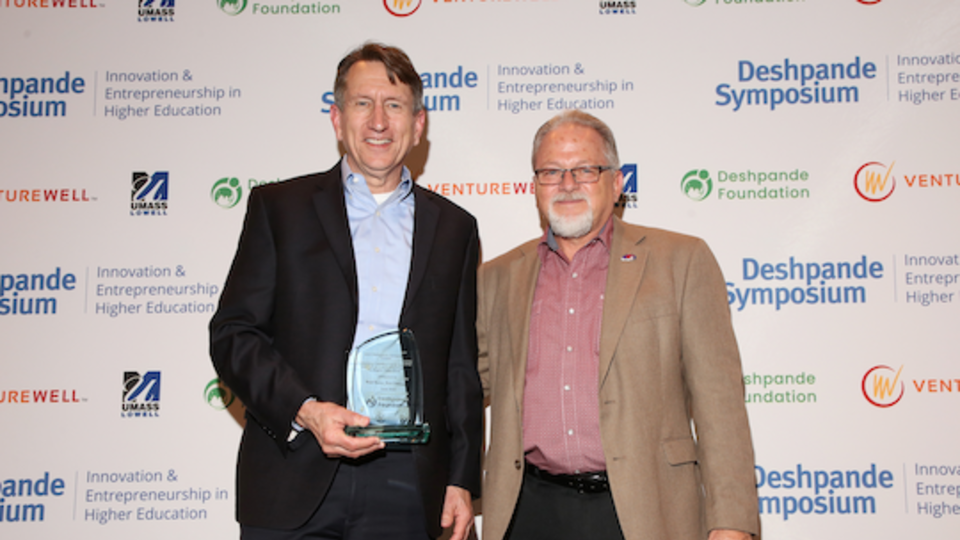
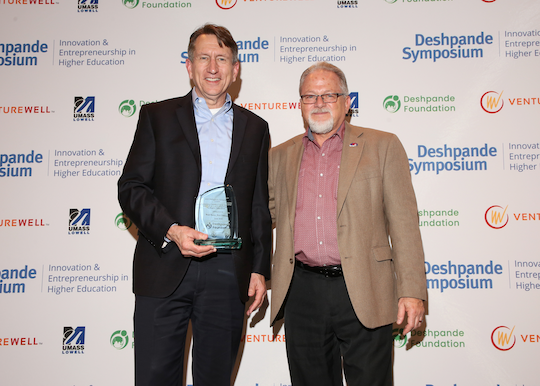
Brad Burke, managing director of the Rice Alliance for Technology and Entrepreneurship, received the Outstanding Contributions to Advancing Innovation and Entrepreneurship in Higher Education Award at the 2023 Deshpande Symposium for Innovation and Entrepreneurship in Higher Education.
The honor recognizes the individual who has demonstrated extraordinary achievements in entrepreneurship in higher education. Founded by Desh Deshpande, a successful serial entrepreneur, the symposium brings together academics, policy planners and practitioners to discuss best practices in integrating entrepreneurship throughout their universities and draws those at the forefront of innovation in higher education.
During Burke’s 22 years leading the program, the Rice Alliance has had a transformative impact on the university, the Greater Houston community and the landscape of university entrepreneurship across the country, Rice President Reginald DesRoches noted in his nomination letter.
“Brad’s sustained leadership has been a driving force in making these transformative accomplishments within Rice and the broader higher education community,” DesRoches wrote.
Internationally, one of the most well-known Rice entrepreneurship programs is the Rice Alliance and Jones Graduate School of Business’s Rice Business Plan Competition. Burke has grown the program from nine regional universities competing for $10,000 in 2001 to 42 global teams competing for $3.4 million in prizes in 2023.
This award for Burke reflects more than 2 decades leadership by the entire Rice Alliance team as a catalyst for growing Rice University’s innovation and entrepreneurship culture and programming.
You May Also Like

Rice University’s Jesse H. Jones Graduate School of Business today announced the launch of its Graduate Certificate in Healthcare Management program, a 10-month, credit-bearing professional credential designed for current and aspiring leaders seeking deep expertise in the business of healthcare.
Failing Forward feat. Ben Clemenceau ’21
Season 3, Episode 18
Ben joins host Maya Pomroy to discuss their shared love of racing cars, what makes Rice different from other MBA programs, his family connection to France (he's a dual citizen), why giving back to Houston is so important to him and the work of finding and being a mentor.
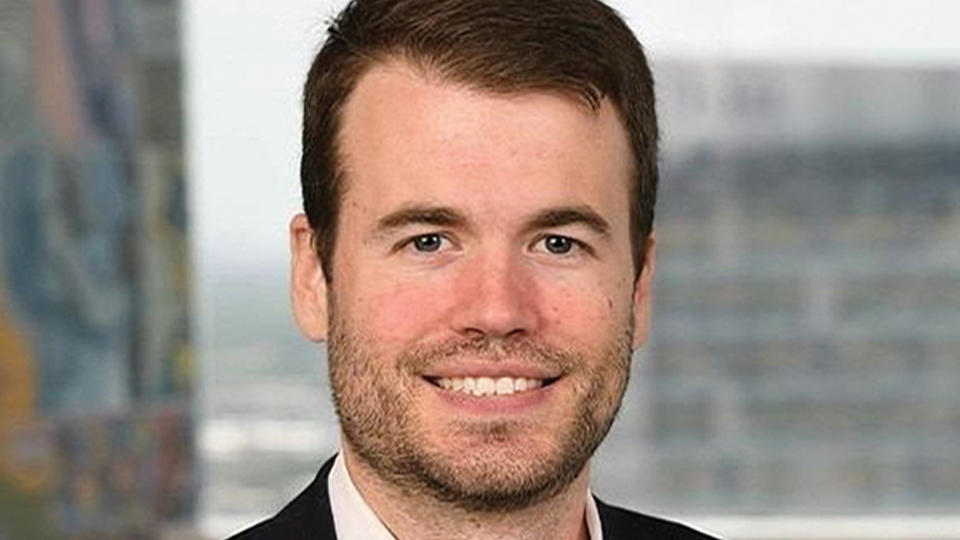
Owl Have You Know
Season 3, Episode 18
Tune in to this episode to hear from Ben Clemenceau ’21, recently promoted from senior strategy consultant to business strategy manager at Accenture. He and host Maya Pomroy ’22 discuss their shared love of racing cars, what makes Rice different from other MBA programs, why giving back to Houston is so important to him and being an impactful mentor.
Watch
Listen
Subscribe to Owl Have You Know on Apple Podcasts, Spotify, Youtube or wherever you find your favorite podcasts.
Episode Transcript
-
[00:00] Intro: Welcome to Owl Have You Know, a podcast from Rice Business. This episode is part of our Pivot Series, where guests share stories of transformation in their lives and careers.
[00:12] Maya: On this live episode of Owl Have You Know, we meet Ben Clemenceau, professional MBA of 2021. Ben shares with us what he has been up to since he graduated. His pivot for market research to consulting, and we also explore his unique family background and how it’s shaped the leadership qualities he has today. We touch on his love of fast cars and his passion for the Houston community.
Hello, and welcome to Owl Have You know, I'm your host, Maya Pomroy. Today, we have a wonderful alumni guest, Ben Clemenceau, who is a professional MBA from the class of 2021.
Ben, thank you so much for being with us here today.
[00:53] Ben: Thank you so much for having me.
[00:55] Maya: Here in McNair, taping on the building in the premises at Rice University, which is fantastic. So, you have had quite the journey and quite the pivot in your career since you graduated in 2021. And it's been accelerated significantly. So, tell me about how Rice has really catapulted you from where you were to where you are today.
[01:18] Ben: Yeah, great question. And I like the word, "catapulted." I always said that Rice acts like a springboard. The MBA acts like a springboard. And it, and it's a great thing for people. So, when I joined, I was working in oil and gas. I'd been doing that for about eight years. I was primarily in a corporate market research function. And I was working a lot with the C-suite, and I gained a certain appreciation for working with the C-Suite. I think that the way that they approached problems was extremely logical and objective. And I knew I wanted to change what track I was on and move away from strategic marketing while still preserving some of that with regards to the people that I worked with and then the way of working.
Very quickly, you know, you start your MBA recruiting kicks off bright and early. And I thought, why not go for an internship somewhere? Consulting was the first thing that popped up. And it made sense, you know. You get the opportunity to take a step back, taste-test a lot of different industries, and get a feel for how they work, get a feel for how the people in those industries think about problems.
And it was a great thing to chase some of my favorite classes at Rice, because I think, as soon as I hit the ground with immersion week, I was in Dr. Haiyang Li's strategy class. And it was one-week intensive learning, lots of cases, but you're learning about all these different businesses and radically different industries. And there are challenges. Some are challenges that seem impossible to come back from. Others seem easy, but they're tricky.
So, consulting, sort of, teased, hey, that kind of stuff, if you like that, keep going with it. And you can join us, and give it a shot. So, I went through consulting, recruiting. It's intensive. It's exciting. It's competitive. And I made it. I joined Accenture Strategy, did the internship with them, loved it, and went all in on on Accenture. I'm a little over a year in now and have, yes, gotten promoted recently, which has been a thrill. And that has been just a massive pivot. I'm still getting to work with that executive audience. The problem-solving is very much that, sort of, logical fact-based problem-solving that I appreciated. But I'm so far now from market research. And the kinds of work I've done over the last one and a half, you could call it two if you threw in the internship years, has really been more varied than I could have imagined, and so stimulating.
[03:42] Maya: In what way?
[03:04] Ben: Well, you know, one day you're working with a client who wants to bring digital to their entire organization and overhaul the commercial side of their business and the supply chain side of their business. And those are massive undertakings.
[03:15] Maya: No, real underachievers that really want to do that, I’m just saying.
[03:45] Ben: Yeah, right, exactly. And then, the next day, you've got a client come to you, and they say, "Blank check, we need to acquire a new company in this space that we're brand new to. How do we do it? Who do we look at? What sorts of entry factors do we consider? What are the psychologies of the leaders in that field that we might be approaching for, for purchase? And how do we approach them and make an enticing offer?" And so, you're always kept on your toes, you're always learning new things. And I think that flexibility and curiosity that it calls on from me has been an exciting thing to practice.
[04:16] Maya:So, let's dig into the professors here at Rice. So, you mentioned Professor Li. And I took that strategy class as well when I was here at Rice. So, tell me your experience with him and how rich of an experience that was, and really, what the professors here at Rice, how they activate parts of you that you don't even know exist.
[04:38] Ben: I think all of them do an excellent job at teaching a particular business instinct. You know, depending on what career you go into after your MBA or depending on what transition you're making, if you, if you remain in your current career through the MBA, some classes are, just by nature, going to be more or less useful or immediately applicable to you than others. But what they all do, regardless of that application, is they teach that instinct. And, you know, from the get-go, for me, as a, as a PMBA, Dr. Li was my introduction to the program. So, I think, you know, not only was that an ice bath that I jumped into that first week, it was a lot of late nights, a lot of case reading and everything.
[05:15] Maya: Yes.
[05:16] Ben: But he does it well. And I think he, kind of, encapsulates that Rice professor and what the values are there. He challenges you. He makes sure that you know what you're talking about and that you can cite what your claims come from within the cases. But, at the same time, I think he does a really good job rewarding creative answers, rewarding outside-the-box thinking. And he also does an incredible job, and this is another thing that I think all the professors have been so good at, he will encourage students to engage each other.
[05:45] Maya: Yes.
[05:46] Ben: Not just him. And that's, and that's so valuable, because if you give an idea, if he says, why might a company have done this, or, what should the company do, and you give your answer, he will then look around the room. He won't betray his emotion, his answer. He'll say, "What do you think?" And he wants somebody to, kind of, you know, fight you a little bit on it and to push back or to agree with you. And it's rare that you can get away with a silly answer without another student jumping at it and taking that chance to say, "Hey, I read the material, and I'm hungry for this, too." But I think he fosters that atmosphere brilliantly.
[06:17] Maya: And then, you have that debate.
[06:19] Ben: Oh, it's great. It's great.
[06:20] Maya: It is. It is. And then, and then you start thinking about things in a completely different way. And that's really part of what I adore about the program, is that you not only get to have phenomenal top-of-the-line professors here at Rice, but also, your cohort and the people that are in your classes and to see different perspectives based on their own backgrounds and expertise. And everybody's there because they are hungry, as you mentioned, to get to the next level and to get to the next step in the next chapter in their life.
And that energy, also, from Professor Li, I think that he's got this dynamic energy where it's palpable. When you're sitting in the class, you know, it's not just to sit and lecture and take notes and, you know, read the material. "I'm going to ask you questions to make sure that you read," right?
[07:10] Ben: Those strategy professors, they get their steps on their, on their smartwatches. They're patrolling the rooms. They're up and down the steps. And it's great.
[07:17] Maya: Yeah. So, if someone is considering Rice, what would you tell them about Rice that's unique and different from any other program? Because clearly, you looked at other programs before choosing Rice, and we'll get to that in a second.
[07:33] Ben: Sure. You know, Rice, I think something that Rice does really well, one of the questions when I was applying was, what is unconventional wisdom to you? And I recall the gist of my answer, but I remember thinking about that for a long time, because if a school asks you a question like that on your entry, that means it's going to be something that they care a lot about.
And there's a lot of conventional wisdom in the business world. There's a lot of constructive and well-laid-out information on the web that can teach you how to approach certain business challenges and situations, well, even. And I think people who self-teach in that regard can learn a lot. But it's not a catch-all, and I think it misses something. And this goes back to the instinct that I talked about earlier.
When you think about the unconventional wisdom that Rice teaches, it's, sort of, a reprogramming in the way that you approach some of these fundamental business truisms and these processes and rules that are taught in accounting and in data and all these things. You've got to learn that framework and that base. But to go further is to craft somebody into a, sort of, an interesting leader of a multi-varied leader. And you find yourself suddenly thinking more critically, and you find yourself searching for the, sort of, what else? And whenever you might come to an answer on a problem, you're suddenly, and this is taught in org behavior and so many other classes, you're trained to say, "Okay, well, is this really it? Are there other alternatives? Are there other potential things lying under the surface that I might have missed in just chasing this basic framework?" So, I think Rice does an excellent job at training that instinct and teaching people to, not just follow, I think, what the conventional wisdom is. And that's really helped, especially, in my trade of work.
[09:18] Maya: And so, in terms of your cohort, can you tell me a bit about your cohort and what the composition was and how many of those new best friends that you're still in touch with and that community piece that's also part of Rice?
[09:31] Ben: Absolutely. My team is like family to me. I'm actually in a couple months going to the one-year-old birthday of their child. So, so exciting. And I do keep in touch with as many as I can. I'm back on campus as often as I can be, and plugged into all the alumni groups.
So, I love my cohort. We started a year before COVID, or well I should say a semester before COVID. And we really got to know each other in person and got to experience Rice in, sort of, all that it is. And they were a great healthy mix of people with engineering backgrounds, of people with business backgrounds. And then, you had people with teaching backgrounds and with theater backgrounds and all of these different, sort of, walks of life contributing to the school meant that you had a diverse set of views to build your classes on. Especially, in my class, I felt like I learned nearly as much from my peers and from their responses to questions and challenges that I did at my professor. And that's definitely not a dig at the professor. That's really because the people are fantastic. I was surrounded by such strong peers.
And I enjoyed feeling like I was, maybe, not the smartest person in the room. I was, like, behind a little bit. And then, I had to play catch-up with these folks. They were inspirational. So, I enjoyed that. I enjoyed their competition when we were all recruiting for the same. And I definitely still stay in touch. I think it's great. I came here knowing that I love Houston. I'm from Houston. And to be able to come back to this campus and to see familiar faces, and even to just run into them at restaurants and networking events and corporate events, has been so, so rewarding.
[11:04] Maya: And that's something that you learn once arrive to Rice.
[11:06] Ben: Yes.
[11:07] Maya: So, that's also something, when I was applying for the program, that wasn’t something that… I mean, I was like, yes, I'm going to meet some new people, but I'm going to get all this great knowledge, and I'm going to further my career, and all that, but then you... it changes you.
So, let's go back to why you chose Rice. You went to Millsaps for your bachelor's of business administration. And you are a native Houstonian, born and raised, but with a background in history, a really unique and rich history, where your family is from France. We'll get to that in a second. But I do want to talk about why you chose Rice. Was it because you are from Houston and it's, kind of, one of these, you know, meccas that you drive by when you live here and you're like, "It would be great to go there?" It's really hard to get into, but, you know, maybe was that always a goal for you? Or, was it something different that really stood out?
[11:53] Ben: Great question. And I think that's part of it. Driving by it, I went to, as a, as a really little kid, all of my, what, K to 8 experience was over in the Museum District. And so, I was always nearby.
[12:05] Maya: Around the corner.
[12:05] Ben: Right around the corner, right around the corner, a few blocks from campus. And it's a beautiful campus. I hear so much about it. And Rice contributes so much to Houston, both in intellectual capital and creative capital. I grew up going to the symphony, and there's so many people from the Shepherd School. And when I drive by campus, I'd see people who didn't look at all like students. I assume they’d be parents or something with young children playing and throwing Frisbees and stuff on campus. And it felt like a community.
And so, that combined with the fact that, yes, it's a competitive school, I wanted a competitive school, I wanted to be part of the Rice ecosystem, however that might be, it turned out for me that was business. And it so happened to be that Rice's MBA program is also one of the stronger MBA programs, so...
[12:44] Maya: In the country.
[12:45] Ben: In the country, in the country.
[12:47] Maya: Actually, the world, now that there is a Rice presence in France.
[12:51] Ben: Absolutely, which is fantastic. I feel like I attended the school maybe a year or two too soon. I would love to visit that. However, yes, global footprint, every time the rankings come out, I'm happier than I was before. So, it's great. Really, I think it's a combination of the fact that it's a competitive serious school, but still a force for good through its contributions to the arts, through the programs, the scholarships and tuition assistance that they provide, to make a difference in people's lives, even through their contributions to things like the Ion Innovation Center.
[12:38] Maya: Absolutely.
[12:58] Ben: I think those kinds of things are exciting. It's clear that they will train you well. But it's also... it's very apparent that they are a good citizen, not just of Houston, but of the United States and beyond.
[13:38] Maya: Yeah, absolutely. So, what other schools did you look at?
[13:41] Ben: I looked all over the place. I looked around Texas. I looked at some of the biggest in Texas, largely at their satellite programs in Houston. But I did consider moving to other cities. I actually looked in Europe. My cousin was at INSEAD. And I loved the school, I loved the program. Ultimately, you know, I think Rice being two years was appealing to me because I really did want to dive back into academia and immerse myself. I looked up at the northeast. And, you know, I really decided, in addition to everything I've already said, I was out of state already for undergrad. I would love to be back here to be home, my home city where I feel like I know every blocks.
[14:17] Maya: So, your childhood. So, let me... this is really, really cool. Your great, great grandfather was the prime minister of France during World War I.
[13:59] Ben: Yes.
[14:00] Maya: And so, your family is French and you're a dual citizen. So, you're a U.S. and a French citizen. So, tell me about that. That's fantastic.
[14:35] Ben: I am. You've done your research. So, yes, my father was born in Bordeaux at the start of World War II. He's got this incredible story where his grandfather was in the French Army and his grandmother was with newborn dad, and they were fleeing the country because the blitzkrieg was going on and the, and the Germans were pushing in. And they fled the country with whatever, you know, valuables and clothing that they could and chartered a boat to Senegal. And so, my father spent the first three years of his life in Dakar, Senegal. The Wolof Tribe helped raise him. And he's got this incredible story before they came to the United States. And so, the family history in France, it goes far back. But yes, my great, great grandfather, he was the prime minister. He was prime minister twice.
[15:14] Maya: Twice.
[15:15] Ben: Once in the early 1900s, and then, again, in the 1910s during the war. He was very much a Winston Churchill before Churchill. I think Churchill was a fan of his. And a lot of his quotes were English translations of [inaudible 00:15:03] quotes. And he's a very fascinating character. He's a, he's a selfless character. He was all about France and victory. And they call him Father Victory, The Tiger, the… all sorts of great names. And he was so selfless that, you know, there are all of these great stories in books about him and in personal writings that are, sort of, a role model to live up to. And it's...
[15:53] Maya: Big shoes to fill.
[15:54] Ben: Well, yeah, almost unfillable shoes. They're incredible. But it does hit different when it's family and when you can visit places in France where you know you've got a real family footprint. It's special.
[16:06] Maya: So, do you have hopes of ever moving to France and having that be your home? Or, is Houston where you're going to stay? I guess you don't know, but would you want to?
[16:16] Ben: Things could change. I'm so loyal to Houston. I love it here. And I do a lot of volunteer work in the area to try to help build a community here. And so, I don't think I could ever truly leave Houston. But boy, would I love to have a little place over there to get away to sometimes? During the summer, June, July, August, spend some time over in France, wouldn't be too bad.
[16:32] Maya: Yeah, no, I agree. I think it would be great. And let's talk about you giving back to Houston, because you actively are a member of The Menil Collection and the Museum of Natural Science. You also do quite a bit of mentoring to peers within the schools that you went to when you were in middle school and upper school, and also with Millsaps, which is where you went for college. So, tell me why you do that, why do you feel that it is important to really give back as much as you can, not only to the city, but to be a mentor?
[17:04] Ben: Sure. You know, I think community is everything and the community's only as strong as the effort that its members put into it. And so, Houston, you know, we want a strong arts scene, we want a strong sciences and education scene. We want green and nice parks. And so, I think it's very valuable to get involved in those organizations, help in whatever capacity you can. And so, I've got the business background. And now, being in consulting, I've worked with a breadth of clients. And I can, sort of, parse out these interesting challenges and come up with curious solutions.
So, working in that capacity, I've gone to these organizations as, sort of, a committee member to help fundraising, to help organize events to raise awareness for things. And then, like you said, mentorship, I think that's another important thing. So, going back to the places that you come from, where you know you've got some shared DNA there. I know what it's like to go to First Presbyterian School and Episcopal High School and Millsaps College. And I know the kinds of values that they instill in people. I'm speaking somewhat of the same language, going back to them.
And so, whether it be working to connect graduating alumni to the professional world or to answer big life questions and try to make some big scary things a little less scary to people who are feeling it in the moment, I'm more than thrilled to do it.
[18:20] Maya: That's wonderful. Are there any other organizations that you're curious about getting involved with here in Houston? There's quite a few, new ones that are popping up. Like you mentioned the Ion.
[18:30] Ben: Exactly, yeah, the list is endless. The Ion is definitely one. I've been attending some events at Greentown Labs, which is, which is big on sustainability, and very interested in that. Healthcare is an area that I have not touched as much as I would like to get involved in. And there are a lot of great foundations and organizations there that work for all the right causes. So, definitely.
[18:49] Maya: So, we're going to, we're going to pivot a little bit and talk about your pivot. So, tell me about your... some of your successes. And I also want to know about your failures and why you decided to pivot when you did.
[19:03] Ben: Definitely. I'll start with the successes because I think those were immediately apparent. It was really, really great to be able to join the program and think to myself, I'm free to make mistakes. This is a space in which I can experiment with new career paths, experiment with new curricula, that I might be... you know, I might, I might have had a rocky start with the last time I engaged them. And I can take leaps with recruiting, with building new networks that, maybe, I wouldn't want to when I'm in a stable job and wanting to play it safe.
And so, I think that paid off pretty immediately. You know, you get out of something, what you put into it. And wherever that is, community, which is kind of what I was talking about earlier, and even when it comes to education in the MBA, I think you get out of it what you put into it. If you're a smart person and you fight and you get into Rice, I think you can excel in the school. But if you really pour your heart into it, you can get so much more. You can squeeze that, sort of, last 5, 10% of material out of it and get something meaningful there.
And so, success is, you know, I think I went about trying to do that early, and that yielded a great offer from an excellent firm. And I really, I think, by the time I was done with my first semester, kind of, had a lot of what I wanted to get out of the MBA already finished. I had, sort of, tied a bow on it, and that was it. And the rest of the MBA, got to spend three semesters enjoying it, taking whatever classes I wanted and spending time doing other things, like being a TA and joining the Athena Group and some of these admissions ambassadorships and such. So, that was great. But again, you know, like you said, you know, there will be failures. And that's often where we learn the most.
[20:15] Maya: Absolutely.
[20:45] Ben: I think, you know, it is a challenge to balance all of those ambitions and all of those things when you really want to pour your heart into it. There are so many clubs to join. There are so many organizations to get involved in. There are so many different classes that you could possibly sign up for. And especially, as a PMBA, when I was working, you know, you're trying to balance all of that at the same time. And then, you've got, what, family to be concerned about and everything else. So, there's a lot on your plate at once.
And it's a very, very sneaky thing. It can, it can surprise you. You'll find yourself in over your head, and that you've bitten off more than you could chew. And there were a few times where you know you falter. And you might falter in important areas where you don't want to. And so, for me, that meant during the recruiting process when I was trying to juggle all of these things and I joined, like, 10 clubs and was so involved. And here I was, trying to compete with people who were taking recruiting so seriously. They were 100% devoted to it. They put everything else on hold. And they went all in on recruiting. And so, for a moment there, I got, I got scared because I was walking into these coffee chats with consultancies. And here were these students saying they were walking out and they were saying, "Oh, yeah, it was great playing squash with you the other weekend, you know. We'll catch up another time." And I pulled the guy aside and I said, "You guys longtime friends or something?" He goes, "No, no, no. This is our fourth or fifth coffee chat by now. Last one, we did over a squash game." And I'm thinking, this is my first, what?
[22:05] Maya: You're playing squash?
[22:06] Ben: Yeah. And so, and so that was a wake-up call. And that was a bit sobering. And so, you'll have those moments. But again, it's a place where you can make those mistakes. It's a place where you can fail a little bit and you fail forward. And so, my moment for that was, okay, I'm going to go in 110%. I started a case competition that was my first case competition ever. It was hosted by one of the major consultancies that was recruiting. I built a team. And we won it. We not only won it, but we won it well enough that we were invited to go to the nationals, which was the first time that Rice was ever invited to go to the Nationals for that competition. So, that was a great, again, lesson learned and failing forward that led to this exciting success, which guaranteed the whole team interviews. And we got some fun prizes and stuff, too.
[22:50] Maya: What competition was it?
[22:52] Ben: That was the Deloitte Case Competition.
[22:54] Maya: And what were the prizes?
[22:55] Ben: Well, you know, it was, it was a, it was a myriad of things, but, you know, I got this pair of headphones, these like little earbuds that you can talk to and issue commands to that I still use today. So, probably, one of the more useful things that I got.
[23:08] Maya: Fail it forward, I love that. That's something that's going to... I'm going to tuck that in my pocket and definitely use that for myself. Fail it, or fail it forward.
[23:18] Ben: Failing forward, yeah.
[22:51] Maya: Failing forward, that's perfect. What would you say is the most challenging aspect of your, of your new role? Tell us about your new role and what it all entails and the biggest challenges you're facing right now.
[23:32] Ben: Yeah, great question. So, the new role, it's interesting. So, in consulting, your exact role, the nature of your work changes project to project. And when you join the firm that I'm with, in particular, we have several unofficial tracks that people can follow.
[23:47] Maya: At Accenture?
[23:47] Ben: At Accenture. And you start to see people who want to explore a lot. And so, they linger in a generalist position and they try a lot of different areas. You see people who are subject matter experts, and they go all-in on something. Whatever that means for the pace of their career, they love that material.
You also have people who want fast growth. And that's what I was going for. From day one, I thought I want to make managers as fast as I can. And so, I started taking stretch roles. Whatever project I was on, I wanted to find projects where I was specifically taking on a manager's role.
And so, to answer your question, my work hasn't changed too much, because the last year or so, I've been doing mostly manager work. But what that looks like on a day-to-day, if an engagement that we sell involves some solution, that solution is usually drafted and operated and managed by a sort of top echelon of leaders. Your partners, or, in our case, managing directors, and the senior managers. Within the project, you've got work streams. And these verticals, these columns are different elements of the solution needed to make it work.
And so, those are usually run by managers, and that's where I sit. I will have beneath me a team of consultants and/or analysts that are working together to crunch the numbers, find out how to make this work, and to develop the solution. And that is an exciting position to be in, because oftentimes, you're, sort of, called to work in both directions. You're working on the ground with your analysts and consultants, making sure those numbers look right, making sure that everything is solid and sound and client-ready.
But on the flip side, you're privy, you're a fly on the wall sometimes to those leadership conversations, which is such a really, really unique and cool place to be. You're there helping sell the work. You're there making... informing the critical decisions on, when can this solution be ready? Or, where does this project go next? What future work can we sell? What future problems can we solve with this client? Especially, if it's a, if it's a larger account. So, it's a very cool position to be in. It's the coolest kind of work that I've ever done. But again, I think I said this much earlier, it really does require flexibility and curiosity, because sometimes projects shift on a dime and all of the hard work and the research that you've done and the hypothesis that you've tested and proven and that you've taken to them and that you're ready for is no longer valid. Or, maybe, there's new disruptive information and you have to go back to square one.
And that can be frustrating, but you very quickly learn that, with those kinds of things, no hard feelings and no frustration. It's all just an exercise in curiosity and openness. And it works for us. It works better for your client. And so, I think it's a win-win when you can adapt in that way. But that's, kind of, what I've been doing for about a year now.
[26:33] Maya: So, tell me about you being a mentor to others. And first of all, I want to know who your mentors are, who they were for you when you were young and as you grew, and who they are now, and the importance of mentorship.
[26:45] Ben: Yeah. I find mentors everywhere. I look for mentors everywhere. And I think that, in the pursuit of a well-rounded life, you almost have to find mentors to help you in each of those different areas. And sometimes, you find mentors that are so impressive and incredible that they will impact multiple areas of your life. And in other cases, they really do specialize, and they show you the path to walk for some specific thing. So, you know, I find multifaceted mentors in my parents, of course, and somewhat reading about family history and some of the characters that came before me, I think, in a way, they don't really speak back, but they mentor me in how they behaved and what their actions were.
But more actively, I... there were a few that really, really did change my life. I had a communications professor in undergrad who really showed me how to think critically and fairly and empathetically. And that has served me. And where so many people are now prizing EQ and the power of empathy, this guy, I feel like he was ahead of the curve. And he put me in, I think, a very advantageous position. And that helped professionally when working with some of the stakeholder groups that I worked with, learning how to communicate with empathy.
Beyond that, one of my managers back when I was in the oil sector was an incredible force. He was the leader and the leader who really showed how to lead from the, from the pack, you know. And there are a lot of, sort of, buzzwords and ways to describe this, but ultimately he's the promoter, the one who lifts those up around him, and inspires them to work, makes them want to do better. And he did such an incredible job with that. He is one of... Actually, I didn't mention this earlier, but he's one of the reasons that I chose Rice. He was a Rice MBA. And he embodied everything that I wanted to be. And so, I thought, gosh, if this guy's coming from that program, I should take a look at it. And he actually... you know, even we'd take a day out of our... or an hour out of our day. We, actually, at one point, worked a joint project with Rice University, with the MBA program. I think it was Vikas Mittal, Professor Mittal.
[28:47] Maya: Yes, I had him as well.
[28:49] Ben: Okay. He helped sponsor a study within my organization. I was working with Cameron International, the big oil company before we were required by Schlumberger. And when we would come back to campus, my manager at the time, Craig, would help me, you know, sneak around campus and take a look. And he'd say, "This is where I studied. This is where I had this class." And that left a mark. That definitely inspired me.
And then, I think more recently, I found a very well-rounded mentor in the manager that was previously on my project. I was, sort of, her understudy before I took over. And she was, sort of, all-in-one. She was leadership. She was the empathy piece in communications. And she was, sort of, this fearlessness, too, that I hadn't had yet. No matter what challenge was thrown at us, no matter what sort of issue might arise, you know, you want to perform for your client. And when something is disrupted, it's a scary thing walking into a client call, armed only with, "Oh, guys, here's this new problem, and..."
[29:49] Maya: "We have to fix it."
[29:49] Ben: "This might set us back. We've got to be careful." She was totally fearless. And she always found ways to look for positivity and to look for something, some shred of hope to cling to. And that sort of stoic nature that she had stuck with me. She's off the project now. She's onto something new, but I stay in touch with her regularly. And I think, you know, having somebody like that where I can now take issues to her and I can say, "Hey, this thing is really stressing me out," and she gives me a plain, straightforward, and honest and intelligent answer. And so, I definitely cherish that. But, you know, that's a lot of people. And I think that there's nothing wrong with that, right? I think that it is important to have as many mentors as you can and to just know what they're bringing you, so that whenever you do talk to them, you can really seek to get the most out of that conversation.
[30:38] Maya: And what kind of a mentor do you choose to be to your mentees?
[30:43] Ben: You know, I hope that they have good things to say about me, because I feel sometimes they walk in and they bring these problems to me and I'm like, "Oh, you know what? That's actually pretty stressful. You're right." And so, you know, you've got to find a way to be a mentor, to be strong, and to try to find what's that wisdom you're going to impart to them.
[30:59] Maya: Unconventional wisdom.
[31:00] Ben: And, what's that? Unconventional wisdom. And oftentimes, you know, I'm young, and I feel sometimes, am I really... is it right for me to think that I could give that wisdom? I think, ultimately, it boils down to being honest. And if nothing more, then maybe I'm that mentor that shows them that, no matter what, honesty can be a real weapon in the arsenal. I think, you know, really, what that teaches people is that honesty can be a really good tool in that toolkit. And I find that, when listening to their concerns and trying to think about what to say, it's less, how do I frame this thing? It's more, how can I just be real with them?
[31:34] Maya: How can you be real with them? Well, that's all that anybody really wants, right?
[31:40] Ben: Exactly.
[31:41] Maya: So, it's probably something that people don't know about you. You did voice overacting. And you mentioned that communications professor that you had.
[31:48] Ben: Yes, yes.
[32:11] Maya: Was that really the door that was open for you to do voiceover work?
[31:54] Ben: You would think so, but he was actually way more focused on, sort of, the philosophy and psychology of communications. I found the voice-acting thing totally by random. I was, I was, like, looking around for new computer parts to put into this computer I was building. And I couldn’t…
[32:11] Maya: Wait, I'm sorry. You were building a computer?
[32:13] Ben: Yes.
[32:14] Maya: Oh, wait, we missed that part. So, wait, let's back up. Wait a minute. So, wait, when were you building a computer?
[32:19] Ben: Oh, since I was a kid, since I was a kid. Whenever... My dad got me this Windows 95 computer when I was a kid. It was for me and my brother. And he put it in the hallway. And we would tinker with it. And we were always in awe of technology and what was going on. And we would always find ways to break it.
And so, he would call up our tech guy, and the guy would come over. And sometimes, it was just software work. But what really got me was when he would pop the side of the case open and start pulling out the wires and all the circuitry and stuff. And it... you know, I loved Legos as a kid. And I started seeing these big plugs that were basically the next evolution of Legos to me. And so, I started looking into it and realized it's really not much more complicated than that.
And I started building computers, be it for gaming or video editing, or even just for fun. I'd build them for other friends of mine. I got into it. And so, when I couldn't find reviews on online for this particular computer part, I was like, "Man, somebody needs to do that." So, I talked to a buddy of mine and he started up a little video channel. And he put together this script that basically reviewed this part that we didn't see any reviews for. And he said he didn't like the sound of his voice, it was awkward, that I should do it. And I gave it a shot. We listened to it. He was like, "This is cool." Now, mind you, I was young and I think I was even going through puberty at the time. So, it was like all over the map. And it wasn't so great.
But eventually, you know, I stuck with it. I started to do it with the company that I was working for with Cameron. We would do instructional videos for oil field engineers, how to install these massive several-ton pieces of equipment. And I would narrate the script for that. I auditioned for some book narration and even some cartoon characters that had some pretty crazy voices, so, the whole spectrum. And it's been a blast. I really do enjoy being in the sound room.
[34:07] Maya: Can you do some of those voice? I'm just kidding. I'm not going to make you do that. No, that's fascinating that… I mean, wow, what a, what a ride, so far. And so much, you know, just the beginning, right? You also... some of your other hobbies is you like race cars.
[34:23] Ben: I love race cars. I'm also good at breaking those, but...
[34:28] Maya: Well, I love race cars, too. So, we share that in common.
[34:30] Ben: Racing of all kinds, I grew up, whenever we'd go to France, we'd spend most of our summers in France. I feel, as a kid, I remember so many trips there. It's hard to count. And we would always be there in time for Le Mans, the 24-hour endurance race. And it was a very affectionate relationship with cars. My dad had a fast car when I was growing up and a convertible.
[34:49] Maya: What did he have?
[34:50] Ben: He had this convertible 1969 or '68 Porsche Targa GT or something like that.
[34:56] Maya: Does he still have it?
[34:57] Ben: No, he sold it, but —
[34:58] Maya: Oh, no.
[34:59] Ben: … it's great because he sold it to some random person. And something like 12, 15, 16 years later, he gets an email or a call from this little old family in Germany, near Stuttgart, near the facility where he bought it fresh off the assembly line while he was living in Europe. And they were collecting old Porsches and restoring them to their original state. And they had his car. They found his name and an old address or something scribbled into the owner's manual.
[35:26] Maya: Really?
[35:26] Ben: And they tracked them down, and they said, "We've etched it back to its original paint job. We've found the original floorboards. One of the mirror flaps were broken. And so, we replaced the mirror and the flap with the OEM and everything like that." And it was a really special thing. I think he was excited to see his baby, kind of, make it back into good hands who would restore it well.
[35:45] Maya: What a sort of really cool story.
[35:48] Ben: Yeah. And that was a special car, too. And it's one I grew up in and with the... much to my mother's chagrin, the top-down through Houston and the nice weather sometimes, we'd be cruising. And he led me to this racing class one time. After driver's ed, he said, "No, I want you to really learn what it feels like to lose control of a car.
[36:05] Maya: When you were 15?
[36:06] Ben: When I was 16, actually. He took me to a skid pad. And they hose down the track. And they had me drive in a big loop going quite fast. And then, the passenger wrenched the wheel out of my hand and put us into a spin and just started saying, "Steer, counter steer, counter steer, like, fix it, fix it, fix it." And I righted the vehicle. And he had me do that 10 or 11 times. And we tested the limits of the car. And it was a thrill.
So, I got into driving fast, which turned into racing. And in college, and for a year... a couple years after that, I would find any excuse to race. I had this little BMW that I would drive. I had friends who had cars that I could borrow. Nowadays, unless —
[36:44] Maya: Those are nice friends.
[36:44] Ben: They're trusting friends, but we were young and stupid. So, nowadays, it's, you know, unless you're sponsored, it's tough. So, I love kart racing. And actually, I've been recruiting on behalf of Accenture a bunch of the Rice MBAs. And you get to meet so many cool smart students when you're, when you're doing that, but you also get to meet potential competitors for the racetrack. And I've found a group of guys who they love it as much as I do. They’d Formula 1 race every single weekend. So, I think we're going to try to have a track day sometime soon.
[37:13] Maya: You know, there's some girls, not some guys. There's some girls, also.
[37:16] Ben: You're actually, you're actually right. I don't know why I said that, because two of them, yes, you were...
[37:20] Maya: I was asking if you recruited them.
[37:21] Ben: You're dead on. You're… exactly. No, we'll have you out there in no time.
[37:24] Maya: No, that sounds awesome. So, what's your favorite car?
[37:27] Ben: That's very tough. But I've fallen in love with, and this is a little more practical than the race cars, but the new Audi e-tron sleek, electric. And whenever you're on the feeder road and you tap that accelerator, you're punched into the back of your seat. I think it's got pickup, but it's also, you know, it's comfortable, right?
[37:42] Maya: Yeah. I actually test-drove that last week, so I know exactly what you're talking about.
[37:46] Ben: Right.
[37:46] Maya: That's funny that you mentioned that. We share that in common as well. So, what's next for you? What do you see yourself doing in the next 3, 5, 7, 10 years? I know it's, kind of, a big broad question, but where do you want to go?
[38:00] Ben: Yeah, I am taking it step by step. So, the first thing, now that I'm promoted to manager, is I have to choose which business practice to align to. And so, I'm revisiting a lot of what I was thinking about in the MBA. You know, where do I want to be? What industry interests me? And I have to force-rank either industries or functions, functions being things like your CFO or enterprise finance kind of stuff or enterprise strategy and pricing strategy, or M&A. And I have to pick which ones do I really want to focus on. And there's a bit of a major-minor system. If I pick, you know, M&A, then I could do something M&A in oil. Your minor would be something like in energy or in agriculture or something like that.
So, you know, where I stand right now, I love pricing and corporate strategy. And I think that's my goal, growth strategy. Secondary, tertiary, you know, energy, it makes the world go around. And Houston is such an energy-focused city. I think, between the network here and the ability to drive change here, energy would be a great place to be. And then, I'm looking at our chemicals and natural resources practice, because I love B2B work and I love the things that make the world go round. And then, that's yet another one, sort of, core engine. So, that's on the short term.
Longer term, I love where I am. I think Accenture Strategy is a great place, and I think Houston is a great place. So, going as far as I can go within the firm in Houston is the goal. And to continue to challenge myself, and to continue to look for, either, projects that are beyond anything that I've experienced or outside of the academic areas that I've, sort of, always been comfortable in. And then, also, outside the industries that I've been comfortable in, so that I can, I can continue to grow in that regard.
Other than that, you know, I have a lot of hobbies, and I just want to keep growing those, making new friends that share similar hobbies. And maybe, one of these days, I'll actually get back into piano. That's been sitting in my bedroom. I've got a piano there. I played for seven years. And I told myself over COVID I'd do it. Here we are, we're out of lockdown, and I still haven't touched it. So, maybe, that's one thing.
[40:02] Maya: Well, the Shepherd School is right there, so I bet you could get some really good teachers to, kind of, get you back into the swing of things.
[40:07] Ben: Oh, absolutely. I'd be honored.
[40:08] Maya: So, last question, if somebody is considering Rice, why Rice? Why should they choose Rice over any other school on the planet?
[40:16] Ben: Yeah. Are you seeking disruptive change? Are you seeking meaningful, disruptive change to where you are, whether that be a measurable jump in the, sort of, subject area knowledge that you've got to be better at what you're doing, or whether you're looking at recruiting into something completely new, whatever that is, you know, it is a very positive shock to whatever you've got going on. The status quo is not survive the MBA.
And I think, if that resonates with you, then you're at that spot. You're at that right moment where it's right. And I've had people come to me and ask, you know, how do you know it's the time? And that's my answer to it. So, I think that's one of the biggest ones.
And I think the other thing is, if you really look at what Rice is doing, and they… I think the school does a very good job at communicating what the school is, you know, doing, not just in Houston, but around the globe, if you’ll look at that and that message speaks to you, you're looking for a place that isn't just a place of learning, but it's a citizen and it's creating new citizens. And that's one of my favorite Rice memories, is at the end of our first week on campus, we had a bit of a champagne toast and we talked a little bit about, what is this going to enable you to do? Who are you going to be when you come out of this program? Not only are you a leader, but you're a good citizen. So, I think it's, sort of, the fusion of those things that should draw somebody to Rice.
[41:33] Maya: That's wonderful, Ben. It's been a pleasure to talk with you today. We really appreciate you taking time out of your busy schedule to be here on Owl Have You Know. And we can't wait. Maybe, we'll catch up with you in a couple of years, too.
[41:44] Ben: Absolutely. Thank you so much for having me here. I love being back on campus anytime I can.
[41:47] Maya: You're welcome anytime.
[41:50] Ben: Thank you.
[41:51] Maya: Thank you.
Thanks for listening. This has been Owl Have You Know, a production of Rice Business. You can find more information about our guests, hosts, and announcements on our website, business.rice.edu. Please subscribe and leave a rating wherever you find your favorite podcasts. We'd love to hear what you think. The hosts of Owl Have You Know are myself, Maya Pomroy, and Scott Gale.
You May Also Like
Empowering Women Entrepreneurs: nCourage Honors Courageous Women at Rice Business Plan Competition 2023
nCourage Entrepreneurs has awarded two teams, Atma Leather (Banofi Leather) and Thryft Ship the investment award for Courageous Women Entrepreneurs at the 2023 Rice University Business Plan Competition.
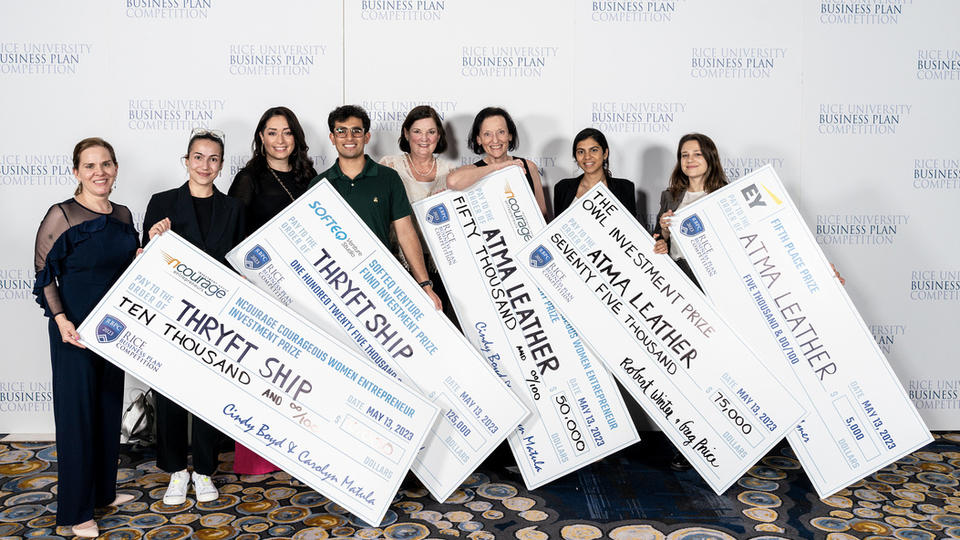
Brown Corporation elects five new trustees
The Corporation of Brown University recently welcomed five new members to its Board of Trustees. Among the newly elected members was Eldridge H. Gilbert III, who graduated with his Rice MBA in 2010.
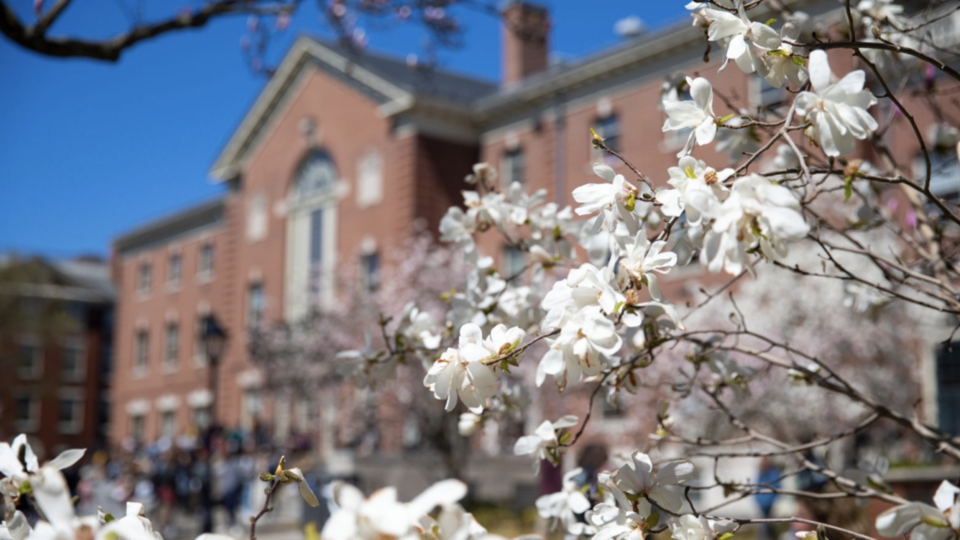
Admissions Director Q&A: Coni Zingarelli of Rice Business
Executive Director of Recruiting and Admissions Coni Zingarelli gives ClearAdmit the inside scoop on the Rice MBA application process. She dives into how interviews are conducted, what happens between hitting "submit" and getting an admissions decision, and which Rice courses are popular.
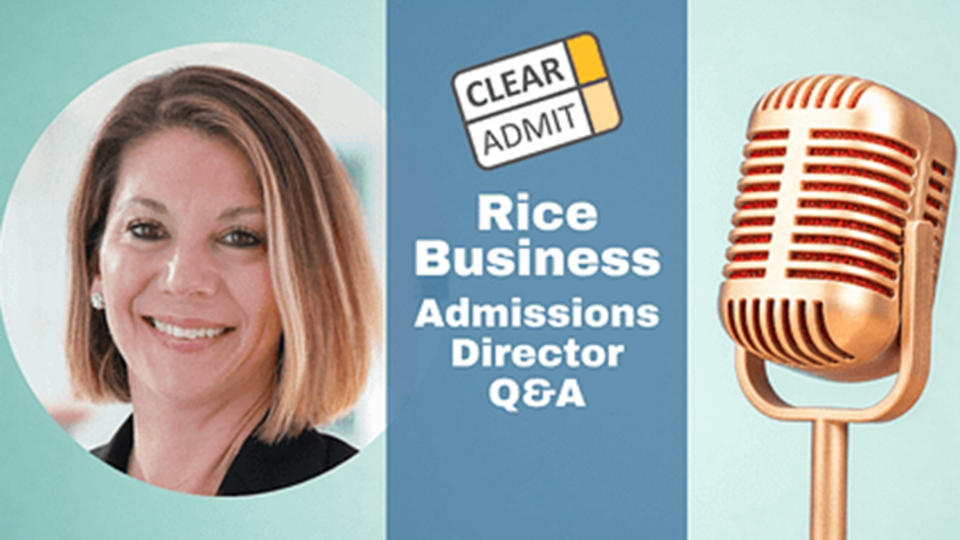
When War Broke Out, This Alum Flew Straight to Ukraine feat. Radu Filip ’08
Season 3, Episode 17
Radu talks about his boots-on-the-ground efforts in Ukraine, the culture shock and challenges of being an international student, pivoting his career from IT to corporate finance and his goals for the year ahead.
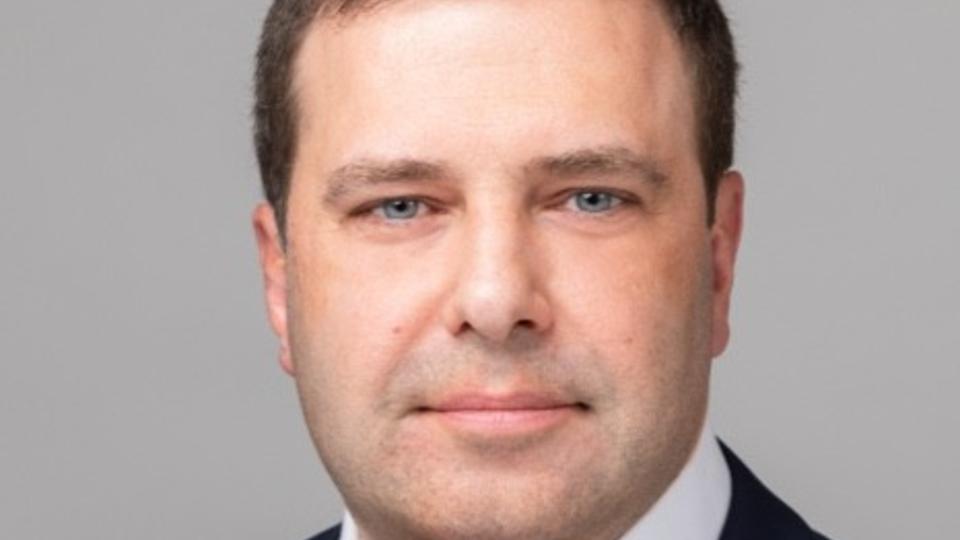
Owl Have You Know
Season 3, Episode 17
Joining Maya Pomroy in this episode is Radu Filip ’08. He is a board member of Elevate Ukraine, co-founded the Houston chapter of the Women's Masters Network, and is the Finance Director at SLB. Listen as they talk about his boots-on-the-ground efforts in Ukraine, the culture shock and challenges of being an international student, pivoting his career from IT to corporate finance, and his goals for the year ahead.
Watch
Listen
Subscribe to Owl Have You Know on Apple Podcasts, Spotify, Youtube or wherever you find your favorite podcasts.
Episode Transcript
-
[00:00]Intro: Welcome to Owl Have You Know, a podcast from Rice Business. This episode is part of our Flight Path series, where guests share their career journeys and stories of the Rice connections that got them where they are.
[00:14] Maya: On today's episode of Owl Have You Know, we talk with alumni, Radu Filip, an immigrant from Romania, who quickly found his way to Rice Business. He discusses his belief in giving back, not only to Rice, the Houston community, but also his work in aiding the war effort in Ukraine. The energy finance executive recently returned from the war zone. He tells us what he did, what he saw, and what he hopes for in the future.
Radu, thank you so much for being with us here today.
[00:43] Radu: My pleasure to be here.
[00:45] Maya: So, I was reading your bio, and there are so many incredible things to dig into with you and to discuss, that it's just, kind of, hard to start. So, you were born and raised in Romania, and you immigrated to the United States with your wife in 2005, and shortly thereafter, found your way to Rice. So, you started at Rice in 2006, right after you came to the United States. You have a BS and an MS in computer science. And you are with Schlumberger right now. You're one of the directors of finance. So, that is your professional...
[01:22] Radu: SLB, we just use the name SLB.
[01:26] Maya: Okay, perfect. So, we'll call it SLB going forward. And we won't call it oil and gas, we'll call it energy. Cool?
[01:32] Radu: Energy transition, innovation, yes.
[01:36] Maya: Yes. So, that is your professional background. One of the most fascinating things about you, though, is that, most recently, in late December of 2022, you went to Ukraine to distribute humanitarian aid to the people of Ukraine through an organization called Elevate Ukraine.
So, I would love to start with that, since that was the most recent. And, you know, I think everybody has this tug to help people, you know, that are going through very challenging and difficult circumstances. But you got on a plane and flew to the middle of a war zone. So, tell me about that.
[02:18] Radu: Well, it starts with my desire to be involved and help the Ukrainian people once this phase of the war started last year. And there are many reasons why I wanted to help. As an American, you cannot resonate with what is, basically, an independence war for Ukraine. So, you cannot resonate, because we fought an independence war many years ago against a more powerful and professional enemy. We had help back then. If you remember, Lafayette and the French who helped us. So, basically, it's the same situation if you take away the technology and the century and so forth. As a Texan, too, you resonate with that, right? You know, think of Mariupol as Alamo, right, the last 10 that bought time for the, for the army of Ukraine to defend themselves in other parts of the country.
And then, last but not the least, as a Romanian, too, because I grew up behind the Iron Curtain. My grandparents have been themselves in the Second World War, refugees from the same enemy Ukraine is fighting today, when Stalin occupied the, you know, Eastern European countries — the Baltics, half of Poland, part of Romania — as the result of his agreement with Hitler.
So, at so many levels, I resonate with the aspiration of freedom and independence of the Ukrainian people and with the uneven fight against a much bigger enemy. So, my... this is the context and my desire to help using my network. And I have many friends after so many years here in the U.S. I was introduced to this wonderful group of people in College Station that are, primarily but not limited, from one church there, A&M Church of Christ. For many years, they have been involved with mission trips in Ukraine, primarily helping orphans in Ukraine. So, they started their involvement many, many years ago, like, almost two decades ago. So, obviously, when the war started, they already had a network there of who they want to help. So, like, many other organizations here, they switched towards humanitarian aid mission. I was very fortunate to get to know them and to join them.
So, this is the context in which I joined. They formed this particular nonprofit, Elevate Ukraine, a nonprofit, specifically for the purpose of helping Ukraine. They have other humanitarian work done around the world, but this one is specifically for this situation. So, the nonprofit started in August. It was when it was formed and all that, and started to raise funds.
By the fall, we already managed to ship an air cargo of medical first-aid kits. And then, by early December, we were able to deliver our first ship container, 40-foot container, filled to the brim with medical supplies — anything from medical beds, mattresses, walkers, wheelchairs, surgery equipments, syringes, anything that a hospital would need. So, it was a good opportunity to be there for the purpose of delivering this aid. And we delivered this to Dnipro.
[05:23] Maya: My grandfather was born there. That's where he was from. So, I have a connection as well.
[05:27] Radu: I'm glad to hear that, you know, wonderful people over there. So, from there, the volunteers and the various organizations who partner with Ukraine, they further distributed this aid to various places, to hospitals in different cities — primarily, in East Ukraine.
So, that was the reason why I went there. Since I was there, the volunteers, the partners we have there, thought it would be very useful if they would show me more than just I can see in one city. So, thanks to their involvement and effort and time, I have a chance to visit quite a few cities in East Ukraine — Kharkiv, Chuhuiv. I've been to Izium, which was just liberated two months prior in the Kharkiv counteroffensive. That was the closest I've been to the front, about 20 miles. Sumy in the North, Poltava, and Kyiv.
[06:20] Maya: So, what is it like on the ground there?
[06:21] Radu: It's absolutely surreal. So, in throughout Ukraine, even in Kyiv, you can see the scars of the fighting that took place in its outskirts, even though the enemy is far away now from Kyiv. And the, and this city is close to the frontline. Like, Kharkiv is the second largest city in Ukraine, about 1.5 million people before the war. There is no one single building I have seen that doesn't have plywood in places of windows, doesn't have some, you know, facade damage. Not to mention, there are many buildings that are much, much worse destroyed.
In the same time, you know, cities like Izium that has been to the frontline, utter destruction. There is no one single building standing whole — schools, playgrounds, churches, apartment buildings, hospitals — absolutely everything destroyed. It is incredible. I mean, it's one thing to see it on TV. When you see it with your own eyes, when you see the places where people actually, unfortunately, died, it's terrifying.
Contrast to that is the attitude of the people, wonderful people, all brave in the face of this utter destruction, all with a huge fighting spirit, with a huge desire to be free, independent, and make their own decisions as a country and as a nation.
One other thing I wanted to add here, when we hear about East Ukraine and we debate here in the United States in school, at work, at university, you always hear about East Ukraine is primarily Russian-speaking, Western Ukraine is primarily Ukrainian-speaking. It makes no difference once you're there. All the volunteers I've been there are native Russian speakers. And all of them said, "Yes, my language is Russian, but my country is Ukraine. And I don't want to live in Russia, I want to live in Ukraine." So, this unity, this bravery, this fighting spirit in the people, it's absolutely amazing. And it's a huge contrast with the destruction I've seen.
[08:21] Maya: So, if people listening would want to get involved in the efforts with Elevate Ukraine, how can they get involved with this organization?
[08:31] Radu: There are multiple ways anybody who wants to help can get involved. Perhaps, the simplest way to involve is to make a donation. We have a Donate button on elevateukraine.org. I was invited to join the board of directors. So, I serve in the board of directors. Everybody there is... has a full-time job and is doing this for completely voluntary — no compensation, no benefit, no material benefit, from working here. So, I can attest that the money will go for aid. The money will go to pay for some of the shipping and the logistics of this aid that we receive... Some of this aid, we receive it as goods from other partner organizations, all right? So, then there is just the cost, like, for the case of the container, it was the cost of shipping and logistics, right?
But also, a lot of people can get involved if they help us partner with our organizations here that would like to help, but don't know how and with whom. This was my challenge in the beginning, the first two months of the war, was, I want to help out, I don't know any organization. I don't know where to go. Yes, I made some monetary donation to a charity I found in the news, but it felt like I was not doing enough.
So, those who want to involve more, please contact me directly. And if you can help us make a connection with other organizations — could be a church, could be a nonprofit, could be a private person, could be anybody — we'll be glad to talk and explore how we can partner to maximize our aid. This organization has a wide network in Ukraine in different cities. So, depending on the needs, depending what various people can help with or the organizations they know or can introduce us who can help with, we can do a lot beyond just donations.
[10:17] Maya: And what is the best way to get in touch with you?
[10:19] Radu: My email and phone number. We have... So, Elevate Ukraine... It's, you know, it's radu.filip@elevateukraine.org.
[10:25] Maya: Perfect. So, my next question is, you're married, and when you told your wife you're going to go to Ukraine in the middle of, you know, a war, what was her reaction?
[10:38] Radu: That's a very good question. Obviously, my family was worried. And not only my family. I have many good and close friends who knew about these plans, and they were all worried. My... obviously, my family and my wife, on the forefront of this. For me, I applied here principles I've learned in the business school and I have learned in the business, in the business profession, which is manage risk, mitigate risk, and minimize it. So, you can make both calculated risks. So, it was all about risk management, in the end.
The timeframe when I went, it was a timeframe when we adjust the timing. So, there was a period of less intense bombing in the cities as it was like the month before. I knew I'm going to be in good hands there, volunteers there who help, who know the right and safe places to be. We spent a lot of time on the road. And you are a bit safer when you are in the middle of nowhere than in a city. But there always was a risk. My wife understood that our desire to help, and she knew that if we can manage the risk and just, you know, live with it for a little while, it's manageable.
But your question made me think about something else, right? Think about all the families there that live with these risks day in and day out, right? I was under this risk for a couple of days. But it's amazing there how people of Ukraine learn to live with this and not be afraid anymore. I was absolutely amazed, the first air-raid alarm, when you hear those sirens starting to sound, you know, you'll feel the vibration in your bones.
[12:17] Maya: Yeah.
[12:18] Radu: I mean, it's a, it's a sound that, you know... Again, you may have heard it in the news and so forth, but when you hear it with your own ears, it's different. And most of the people were not running scared to the shelter. Most of the people said, "You know, we've been living with this every day for the last eight months." By the time I was there, it was eight months. "We're not afraid anymore. Yes, there is a risk. There is a possibility that the fate, you know, may be not good for us today, but we're not afraid." And that kind of bravery and defiance and the result, again, motivated me to say, okay, they're not afraid, I should not be afraid, either, now I'm among them and I experience what they're experiencing. And the communication back home every day was a key to let know family and close friends that I'm good, where I am, where I'm going. It was a bit tough one day when Central Kyiv was bombed and I was there in a, in a hotel. I was not impacted in any way, but the power was cut off and I could not text home for, like, about six hours that I'm safe.
[13:18] Maya: Wow.
[13:18] Radu: That, perhaps, was the most dramatic moment of this. But my family, my friends, knew that I want to help, knew about my desire, and they all supported me. I could not have done this without the support of my family and my close friends.
[13:32] Maya: So, do you have plans to go back?
[13:36] Radu: I’d like to go back if the opportunity appears and there is a good reason to go back. You know, if we can organize together another container or two of eight and if it's a good reason to be there, I would like to go back. I made new friends over there. I met wonderful people of all kinds of professions and who are all, you know, helping in this effort. It's just great to be among these people and just be with them and feel their spirit and their hopes.
[14:05] Maya: One of the things, also, is that I think that, looking ahead, and one of the other things that we learned in business school other than risk management is also strategic planning. So, if they are victorious in this war, it's going to take a whole lot of resources to build that country back up to where it was because it has been decimated.
[14:25] Radu: You're absolutely right. I mean, the amount of destruction varies by region, but is very significant in very large parts of the country. And yes, there will be so much work to do there for years to come beyond this work.
[14:40] Maya: Yes. And so, let's segue, because you had a really great one, about why you decided to go because it's what you learned in business school. So, let's travel back to Rice from Ukraine. And I would love for you to tell me, why did you choose Rice? And you certainly... is this something that you wanted to do while you were still in Romania before you set foot in the United States? Is this something that was a plan for you? Or, was this something that came to be once you immigrated here from Romania?
[15:15] Radu: Well, you know, basically, all of the above. Look, I never heard of Rice before I set foot to Houston. And perhaps, you know, all this little story, that's saying by generalizing how it applies, which says plans are useless, but planning is indispensable, right?
[15:31] Maya: Yes.
[15:32] Radu: So, going a bit further back in time, going behind the Iron Curtain, my country managed to break free when I was 14. So, I'm... I was old enough to remember.
Growing behind the Iron Curtain, I grew up with the desire of the forbidden fruit, which was the United States, the archenemy of the Eastern Bloc, right? So, I always have a desire to come to America, but it was not defined in any way. It was just a desire. And as I grew up, as I started to... after we became a free country, I started to go to high school and college, those thoughts about going to America started to articulate more and more, right? They become more defined.
I chose to work in... to get degrees in computer science. One reason is that my mom was a software developer, software engineer. So, there was a lot of family influence there being around computers before many other people in Romania could have seen a computer. But also because, at that time, in mid-'90s, IT was the only industry with global exposure. And I always have the desire to do... to see the big picture and to do things at a large scale. So, obviously, that was a natural choice for me.
And while I started my profession as an IT engineer, my thoughts developed further, and I said, okay, I want to go to work in the management of a large American global company. That was my American dream. So, obviously, to move from IT to more, let's call it master management, the MBA was the key. I immigrated to the United States as an IT engineer. I was hired by a company called 3DGeo, which was in seismic processing. This is a sub segment of the industry, very upstream oil and gas. And those geophysicists, they're trying to understand the layers of the earth. So, exploration companies know where to take the risk to drill.
[17:19] Maya: Right.
[17:19] Radu: And as soon as I set foot in Houston in October 2005, I started to look also for MBA options. At that time, Rice University just announced their evening professional program. Because I have to work full-time with this company that brought me here, so I could not be a daytime student.
[17:36] Maya: You have to learn how to juggle.
[17:38] Radu: Yes. And also, I knew from my hometown, Iași, which is a big academic city, I knew a professor, Mr. Gerry Ramey, professor of management from Eastern Oregon University, who came there as a Fulbright scholar. So, I reached out to him. I said, what's the best MBA program in Houston? He said, "Go to Rice." That's how I learned about Rice. Somehow, it worked, right? I went to the information session. I still have somewhere here in the library, the tag which is saying Radu Filip, prospective student.
[18:04] Maya: Your name tag, you still have that? That's great.
[18:06] Radu: I applied. I interviewed. Luckily, for me, I was admitted. And yes, I did my MBA two years evening, weekends, and summer while I worked for a mid-sized company in Romania.
[18:19] Maya: And then, you were also awarded the Jones Citizen Award for Excellence. And you also co-founded the Houston Chapter of Women's Masters Network. Was that at the same time while you were in... I mean, is there, like, what have you not done? Like, there's the...
[18:33] Radu: Well, again, when you, you know, you come to America, you come armed with, again, will to succeed. You realize the chances that this country can give you, if you are open and work hard and take risks and chances. So, yes, the Jones Award was for my grades. I managed to get good grades working on many project assignments, sometimes individual, sometimes with my classmates. I'm thankful for that.
The Women's Masters Network is a story into itself. So, I was serving in a student alumni committee. And I had a colleague, a lady, Tonya Olpin, from the daytime student program. At the beginning of the second year, when those student clubs have a day where they tried to recruit memberships, I stopped by her booth for Women's Masters Network. Back then, it had a different name, but let me stick with this, to say hi to her. And, you know, in the middle of few women students, MBA students, and herself, she dared me to join. And I said, "Okay."
[19:30] Maya: She dared you? That's bold.
[19:33] Radu: Yes. Yeah, she is bold. And professional women are very bold because they have so many other obstacles they have to overcome. So, I said, okay, I take the challenge, but I'll not be a figurehead just for the statistics of the organization. I'll get involved, because when I get involved somewhere, I like to make a difference. So, yes, so that's how I joined the university chapter. And then, we all graduated. Then, we co-founded the Houston chapter, together with women MBA from University of Houston and then a few other universities in Texas. And I've been involved over the years in subcommittees, committees.
There is one other caveat there. Later, I end up having three girls. I have three kids. I have three girls. So, my mission with Women's Masters Network changed, because every single bit that I can help to improve the prospects of women advancing in their career in their professional field, down the road, hopefully they will help my girls when they'll be grown up, too, so...
[20:29] Maya: It wasn't a coincidence, was it?
[20:31] Radu: Yeah.
[20:32] Maya: So, how old are your girls?
[20:33] Radu: 14, 11 and a half, and 10. So, eighth grade, sixth grade, and fourth grade.
[20:39] Maya: So, do they speak your native language? Do they speak Romanian?
[20:43] Radu: They do. In our family, we travel a lot. So, as each of them reach the age of six, so staggered, we start sending them to Europe to grandparents to spend summer with grandparents, which is important to develop their bonds. They're so lucky all the four grandparents are alive, and they can take them to trips and see around. So, we want family bond to develop. But their grandparents also don't speak English. So, when you live two months in another country, you are...
[21:11] Maya: Forced.
[21:12] Radu: And kids learn languages very fast. Yes, they are forced by circumstances to learn the language. And they are learning very fast.
And for me, it's important they speak Romanian, because, you know, Romanian... being Romanian-European is our contribution to America's melting pot. And it's my girls' heritage here, right? They're all born and raised here in Texas, but it's important to understand through family what they're contributing to all this diversity that makes America great.
[21:41] Maya: Absolutely. So, tell me about your time at Rice, because you also got involved with the Baker Institute. You really soaked in and took advantage of every opportunity during your time at the university. So, tell me about your involvement with Baker.
[21:56] Radu: Baker Institute as a building is sitting right across Jones School of Business. Proximity is important, for one thing. The second thing there is that, you know, the Rice Business school had some events hosted in the [inaudible 00:21:55] of the James Baker Institute. So, that's when I first set foot in it.
And then, I was familiar with the work that Mr. James Baker III did, the former Secretary of State, because he was instrumental in the negotiations with the Soviet Union when the Soviet Union was losing the Cold War for the reunification of Germany, and more broadly speaking, for the transition in former Eastern Europe. So, I knew of him, even from Romania, I knew of him and his contribution to this. And then, I was just... I didn't know that he has a think tank before I came here.
So, when discovering that, you know, such a prominent American statesman had a think tank and it's right across my school, it was a natural attraction. I could not not get involved. And getting involved is very flexible, right? You can choose what events you want to attend or not attend. You can choose what committees you want to serve or not to serve. And my involvement, the intensity of my involvement, evolved over the years with, you know, before I had kids, after I had kids, the stages in the school cycle of my kids, and so forth. It was not constantly the same intensity, but it's a great opportunity.
And one thing that I like about the Baker Institute a lot is that, in my opinion, it is a very intellectual, elevated, and civilized way to do... to discuss politics because you focus on policies, you don't focus on, you know, the emotional part of politics that happens through, you know, ads during the campaign or happens through memes on the internet and so forth. No. It's a much more intellectually elevated way to discuss policy instead of politics. For me, it's a natural fit to be there and be among people... like-minded people and be among these statesmen who had such a contribution to this country.
[23:56] Maya: And to many countries. He was, he was quite the statesman. Let's talk about how it is to be an international student at Rice, because even though you immigrated here and you're an American, you know, your roots and your home country, well, is Romania. But now you're an American. So, if there are international students that are considering coming to Rice, can you shed a little light on what it would be like for them and speak about the diversity that Rice offers?
[24:27] Radu: Absolutely. So, I was amazed from the beginning to discover that, just in my class, about more than a quarter of the class were international students from various continents, not as many Europeans, but there were students from everywhere — from Asia, from Latin America, from Africa. And this diversity is amazing because you discover how different life experiences and then work experiences in different cultures in the world, how they generate multiple perspectives in approaching the same problem, whether it's a business problem or organizational problem. So, I was amazed by that.
I had some expectations about American universities, in general, being very open to international students, to this diversity of opinions and experiences and perspectives. So, it was not a complete surprise. But I was still surprised and impressed seeing to what degree it manifested.
The greatest challenge that international students face are twofold. One is that, when you come here and start university right away, there are many aspects of American educational culture that you may not be familiar with. And for example, the fact that you start the first year and, immediately, the recruiting session starts for the next summer internships. You know, in America, here, we plan things so far out. But that was not a reflex for me or a way of thinking when I came here. So, you have a... It's a lot of catch-up things that American students know that normally happens in the, in the progression of the academic year that international students don't know. And you learn along the way very fast. And you have to catch up. And you have to understand. If you have a chance to do high school here, then you are a bit better prepared for those things.
Second is the cultural aspect, right? There is a cultural shock coming to America. You know, if you've traveled before or if you have been exposed to working for Americans before, again, it helps. But it is a cultural shock. And, you know, cultural shock doesn't... it's not negative or positive. It is what it is, right?
[26:38] Maya: Right.
[26:38] Radu: So, you need to be prepared for it, right? And especially in Texas, where you have to drive anywhere. So, if you don't have a car, you are having a very difficult life as a student, even to buy groceries, for example, right?
[26:49] Maya: Yeah. So, you're a bit at a disadvantage.
[26:51] Radu: I mean, I never had a car or a driving license before I came to the United States, right? So, it's this cultural shock. And the best way to mitigate the cultural shock is to bond and be open and make American friends that they can guide you very quickly and they can, you know, help you be immersed into this culture here.
And the third aspect, as an international student, is the fact that many companies, especially large companies, have a policy where they do not sponsor for work visa or for, or for a green card. And this oftentimes puts international students at a disadvantage. Now, there are, again, ways to mitigate that, right? So, university, if I understand correctly, being an elite university and there is some classification of the U.S. government, the right to work after graduation, it's as long as three years as opposed to the standard one year, right? So, that is a way this is mitigated.
But the very fact that our country does not have a formally merit-based, defined immigration system where you can apply for yourself to come here puts these students at a disadvantage. There are ways to deal with this challenge. And it's a bit unfair on the international students while we have to put our house in order. But they will face this challenge.
I was very fortunate that the company, they brought me here. And while I work with, while a student, they sponsored me for a green card. So, I owe this to them for sponsoring me. And they knew that, sponsoring me, they knew that, once I finished Rice, I'll most likely leave and work somewhere else. But it made the whole difference in the world that, when I went to interview, I could say, "Don't worry, I have the right to work here."
[28:24] Maya: Right.
[28:25] Radu: Over the years, I remain involved with the, with the Rice University and the International Student Alumni Board. Because again, I think it's important exactly what we're talking here, to share from my experience with the incoming international students and talk about exact same things we cover here in this discussion. And I always encourage them and say, "Look, it's going to be a bit harder. But, you know, where there is a will, there is a way. And the best place to show resolve and determination and succeed despite all the hardship, the best place for that is America. So... and it's interesting because I remember encouraging students, international students, during the Great Recession, which was the worst time for international students to be here.
[29:05] Maya: Right.
[29:06] Radu: Companies were not hiring anybody, not only international students and so forth. So, encouraging my, you know, my younger colleagues there was so important. And it happens that, later on, some of them, I mean, you know, Rice is a good school. Eventually, most of them made it. Some of them now serve alongside with me in this international alumni board as alumni. So, now, we advise the new students and say, "Look..." You know, for example, there is a colleague, Jesus, I know from Oceaneering. I said, "Jesus was in your situation, this very situation. And look, he made it, we made it, you'll make it, too."
[29:37] Maya: Where there's a will, there's a way, and it's worth it — three Ws.
[29:41] Radu: Yeah.
[29:41] Maya: So, you did come to Rice and you were in IT, and you transitioned into energy finance. So, tell me about that and how that came to be. And I know that you were at Cameron that was then acquired by SLB. So, tell me how you made that transition from one industry. I mean, you really pivoted your career.
[30:03] Radu: I did. And, you know, everybody's career is different. And so, in my case, the MBA was the hinge, was the pivot that allowed me to move from a pure IT field to the world of corporate finance. So, I wanted to do this pivot because, in the end, the business is run based on business performance, which is numbers — earnings per share, market share, profit margins, and so forth. So, I wanted to be in the finance world because I'm closer to where the business is run. But in reality, I never completely quit the IT field. So, I'm somewhere in the intersection of both. Just like you mentioned earlier, I am a proud naturalized Texan and American citizen, but I retained the Romanian and EU citizenship.
So, same thing in my career. I work in, let's call it broadly corporate finance. It could be finance hubs. It could be our work through corporate finance. But I have an IT background that I apply in my finance work every day. Because of my career, I started late, I could not have been an accountant, I could not have had the accounting controllership track because I didn't do my five years of audit with, like, PwC and Deloitte and those.
[31:16] Maya: Right.
[31:17] Radu: But I could apply the principles of IT operations, which is about efficiencies, process, scalability. And I can apply those principles and those, even, technologies now to the field of finance to drive efficiency in the finance world — improving the quality of our financial statement, decreasing the cost, increasing the efficiency, simplifying processes, and so forth. So, my work in corporate finance is less accounting in nature, is more around efficiencies and optimization and transformation in finance, to which I apply all the experience from the technology space.
[31:55] Maya: So, tell me, because now you're a dual citizen, as in IT and then finance, right? So, that's great, you've got dual citizenships in both.
[32:04] Radu: You're right.
[32:04] Maya: So, tell me, how do you see the energy finance space evolving, especially since we are in the midst of an energy transition? So, tell me how you see the future of energy finance, especially here in Houston.
[32:19] Radu: This is a topic that was discussed at length during the last Rice Energy Finance Summit, which is a one-day summit that takes place at the Jones School of Business every year, in the month of November. So, this topic was actually the main topic last November. We are in the middle of a finance transition, there is no question about it. Countries around the world, they invent policies towards clean energy. You have the industry, especially the auto industry, switching investments from internal combustion engine to electric. You see investments in grids, in electric charging stations. There is no doubt that there is a transition.
Now, we have to remember that this kind of transition takes a lot of time. They're not, like, flipping the fingers. Put it this way. The automobile was invented, you know, what? Very late 19th century. And by mid-20th century, you still have in various parts of the world a mix of automobile and horse-driven vehicles, right? The transition to automobile didn't happen overnight. Those two coexisted in various proportions. So, the same thing will happen with electric vehicles, which I'm focusing on electric vehicles because 70% of the hydrocarbon extracted, primarily oil, goes to fuels. So, fuel means transportation. Therefore, that's why electric vehicles are so essential to this energy mix and transition. So, the transition is happening.
Now, what is interesting in this space of renewables and new energy is that there are a lot of ideas. There are lots of technologies. It's not clear which technology is emerging. There is a lot of activity, innovations, inventions, startups who come with different approaches. So, it's a, it's a very active space from an innovation point of view. But there are no clear winners yet on, like, a mainstream type of technology or standard. And because of that, the investment profiles are very evolving, too, to the point where, you know, we don't know exactly what capital allocation model would work, what investment profile would work, what kind of expectation we should have, and so forth. So, it's all, it's all work-in-progress, if I can summarize it like this.
Now, this is the opportunity that the legacy big oil and gas companies can bring to the table in this transition, if they are smart to embrace it. And I work for a company who's very smart, and they fully embrace it.
The thing about oil exploration is very complex. And if you take out the hydrocarbon and the technology extracted, oil exploration is a lot of risk management, right? Again, in the oil exploration, you don't know which exploration's going to yield the discovery or not and how big the reservoir is versus estimating and so forth. So, the large established energy companies, they have a lot of expertise with dealing and managing the risks and the uncertainties that the transition towards clean energy entitles.
[35:20] Maya: Yeah, it's definitely going to take some time. And I agree with you that it's going to be multiple innovations and multiple ways of having energy in different types for the foreseeable future, because it is a decades-long process to switch.
[35:34] Radu: In this context of the big established energy companies now embracing this and government, so they apply all these lessons of risk management from the past in the finance function, evolves with that, right? So, I see, I see the... because you asked me about the finance function in energy, right? It's really about being at the forefront of exploring and trying to discern from this less-than-crystal-clear future, what is the best course of action? So, finance can steer a lot of these companies in the direction of, how we make clean energy profitable, how we generate revenue streams, how we manage, do we have cycles, we don't have cycles, how that looks like, and so forth.
[36:15] Maya: So, I'm wondering what goals you have for yourself for this year.
[36:18] Radu: My primary goal is to continue to grow and acquire experience at SLB with the work I'm doing. I'm taking up more responsibilities, working on significant projects and programs that advance the company's performance, that advance the company on this road towards energy innovation. So, career-wise, obviously.
The second objective I have is to continue to help and find more ways to help the people of Ukraine through the Elevate Ukraine, a nonprofit I serve into. And third is to be able to also manage to have time for my family and be around my family, be around my kids, and help them grow. Because I'm of the school of thought that you cannot outsource 100% of your kids' education and development to the school system, no matter how well the school system is funded. There is a role parents play. Review homeworks with them, talk with them, teach them things that school don't teach them, and so forth. So, I will sum up this as my few objectives for the year on the personal side.
[37:24] Maya: Do you have hopes of one or all three of your daughters of attending Rice? Because, now, they do have an undergraduate program. I'm just putting that out there.
[37:32] Radu: Obviously, I do, as a Rice Owl that I am. Since they were small, maybe since they were five to six years old, we always bring them to Rice on the, on the homecoming weekend. We always go there on a Saturday and spend the full Saturday in the campus, visiting various buildings, meeting with friends and colleagues. They were small. They were playing hide and seek inside Fondren Library.
[37:57] Maya: Oh, nice. That's... I bet there's lots of good places to hide in there, for sure.
[38:03] Radu: Absolutely, exactly. They... I always take them to my business school. We'll always find an empty classroom. And, you know, they choose a topic that they, for fun, present on the whiteboard. So, for me, as a, again, a parent and as an alumni, I expose them to the university setting. They see students — even in the weekend — studying, doing their homework. So, we planted those seeds. And they're all excited about Rice. And they always ask me, "We want to go to Rice next time," and so, forth. So, I hope that they will choose Rice one day.
[38:32] Maya: Well, I hope the same for my children as well. So, fingers crossed, on both of our behalfs. Well, Radu, it's been an absolute pleasure to talk with you today and we so appreciate your time. And again, mention one more time how people can get involved with aid to Ukraine.
[38:47] Radu: Thank you. It was a pleasure for me as well. The best way to involve is either to make a donation or to contact me. ElevateUkraine (in one word) elevateukraine.org, O-R-G.
[38:59] Maya: Okay. And I would love for you to keep us posted if you're planning another trip. Would love to circle back around with you and have you back on the program.
[39:07] Radu: Absolutely. I really appreciate that. And thank you for your time today.
[39:10] Maya: Thank you. Thank you so much.
Thanks for listening. This has been Owl Have You Know, a production of Rice Business. You can find more information about our guests, hosts, and announcements on our website, business.rice.edu. Please subscribe and leave a rating wherever you find your favorite podcasts. We'd love to hear what you think. The hosts of Owl Have You Know are myself, Maya Pomroy, and Scott Gale.
